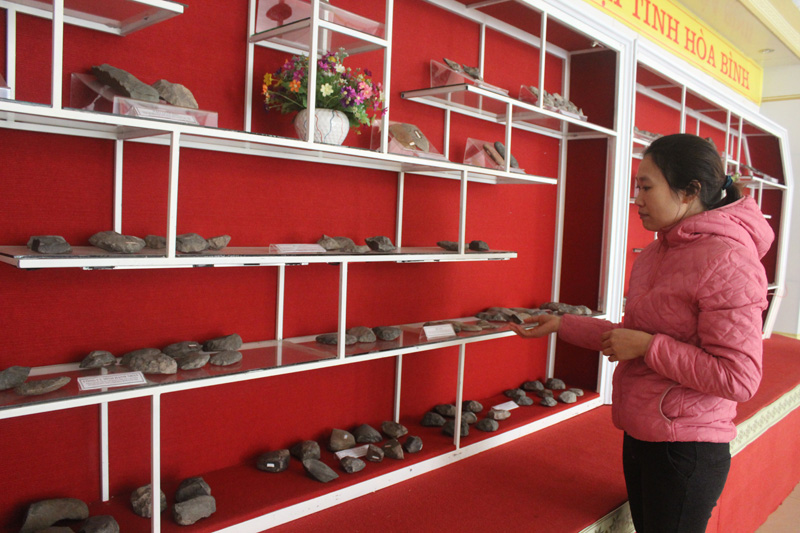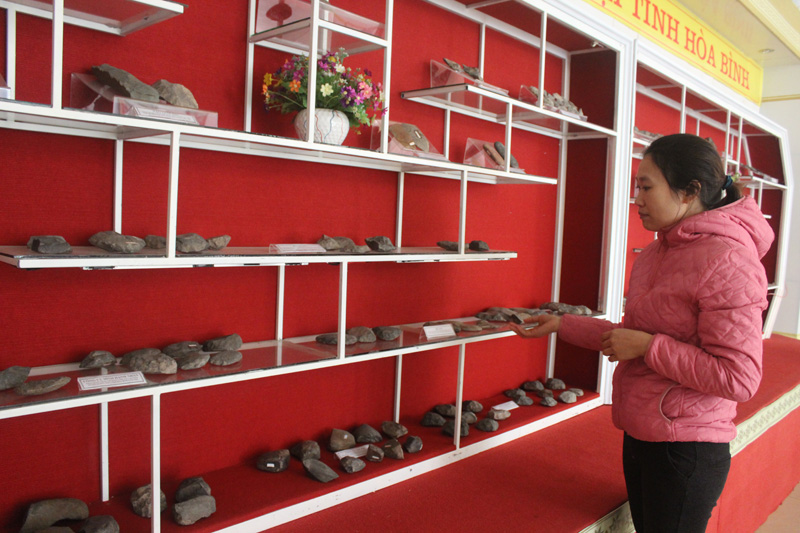
(HBO) - As introduced by Bui Thi Thien Tan – an official of the provincial museum staff, I contemplated every stone artifact displayed in the lively and warm space. There are over 300 artifacts on display here which have become "messengers of time" to relive unique values of Hoa Binh Culture.

Photo: Official of the provincial museum introduces stone
artifacts of Hoa Binh Culture
Tan said the most feature of Hoa Binh Culture is the collection of tools made
from pebbles. By combining technical methods of splitting, grinding, cutting,
hewing, sawing, residents of Hoa Binh Culture has made many tools such as long
and short blades and axes, stone hoe, hinged axe with shoulder. They also made
some tools from pieces of stones, bones, horns and shells. These are
rudimentary tools, bearing the value of a unique prehistoric culture.
"Hoa Binh Culture is defined as a link between the old stone age (Son Vi
Culture) and the new stone age (Bac Son Culture)".
Next to the space for stone-age artefacts is a display of "Fine Arts in
Hoa Binh Culture", which proves that artistic activities of Hoa Binh
Culture appeared. If visitors look closely at each object, they could see some
patterns engraved on stones or bones, mostly geometric patterns such as
parallel lines, concentric circles or simple drawings such as water waves, comb
teeth, fish bone. Besides art, residents of Hoa Culture Binh had their own
aesthetics concept. They knew how to make simple and vivid jewelries. From
bones and shell fishes, they knew how to drill hole and cross thread to make
delicate and pretty bracelets, necklaces, earrings.
In the "Cave Model” space, the museum relived part of lives of prehistoric
people of Hoa Binh Culture.
The display was part of celebrations for the 85th anniversary of the world’s
recognition of Hoa Binh Culture. In 2017, the museum showcased outstanding
values of Hoa Binh Culture, with hundreds of stone artefacts – "messengers of
time” over the past hundreds of thousands of years imbued with Hoa Binh Culture
– an attractive prehistoric culture that contains mysterious and long-lasting
values.
With an increasingly vibrant and widespread emulation movement aimed at building cultured residential areas and cultured families, Yen Thuy District has been making steady progress toward improving both the material and spiritual well-being of its people, while fostering a civilized, prosperous, beautiful, and progressive community.
Once lacking recreational spaces and community facilities, Residential Group 2 in Quynh Lam Ward (Hoa Binh City) has recently received attention for the construction of a new, spacious, and fully equipped cultural house. The project followed the model of state support combined with public contributions in both labor and funding.
The "All people unite to build cultural life" movement, which has been effectively integrated with Kim Boi district’s socio-economic development goals, is fostering a lively spirit of emulation across local residential areas, hamlets, villages, public agencies, and enterprises. In addition, through the initiative, traditional cultural values are being preserved and promoted, while community solidarity and mutual support in poverty reduction and economic development are being strengthened.
A working delegation of the Hoa Binh provincial People’s Committee led by its Permanent Vice Chairman Nguyen Van Toan on June 11 inspected the progress of a project to build the Mo Muong Cultural Heritage Conservation Space linked to tourism services in Hop Phong commune, Cao Phong district.
Born and growing in the heroic land of Muong Dong, Dinh Thi Kieu Dung, a resident in Bo town of Kim Boi district, in her childhood was nurtured by the sweet lullabies of her grandmother and mother. These melodies deeply imprinted on her soul, becoming an inseparable part of her love for her ethnic group's culture. For over 20 years, this love for her hometown has driven Dung to research, collect, and pass down the cultural values of the Muong people to future generations.
In the final days of May, the Ethnic Art Troupe of Hoa Binh Province organized performances to serve the people in remote, mountainous, and particularly disadvantaged areas within the province. These were not just ordinary artistic shows, but they were the meaningful journeys aimed at spreading cultural values, enhancing the spiritual life of the people and contributing to the preservation of ethnic minority cultural identities.



